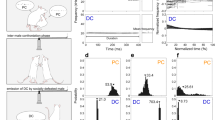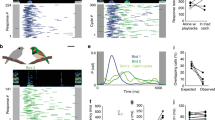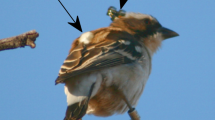Abstract
EXPERIMENTS on the ‘bush cricket’, Pholidoptera griseoaptera (De Geer), using artificial signals1 have shown that these have an inhibitory effect on chirping. Further work has shown that the chirping of one male has a similar inhibitory effect on other males. In addition to their inhibitory effect, artificial signals increase the overall chirp rate and alter the timing of chirps so that they tend to occur in the first second after the end of the inhibitory period. These excitatory effects are shown when the total basic chirp rate is below 30 per min; the signals actually depress the chirp rate when it is high.
This is a preview of subscription content, access via your institution
Access options
Subscribe to this journal
Receive 51 print issues and online access
$199.00 per year
only $3.90 per issue
Buy this article
- Purchase on Springer Link
- Instant access to full article PDF
Prices may be subject to local taxes which are calculated during checkout
Similar content being viewed by others
References
Jones, M. D. R., Nature, 199, 928 (1963).
Kennedy, J. S., and Booth, C. O., J. Exp. Biol., 40, 351 (1963).
Busnel, R. G., Dumortier, B., and Busnel, M. C., Bull. Biol., 90, 219 (1956).
Author information
Authors and Affiliations
Rights and permissions
About this article
Cite this article
JONES, M. Inhibition and Excitation in the Acoustic Behaviour of Pholidoptera. Nature 203, 322–323 (1964). https://doi.org/10.1038/203322a0
Issue Date:
DOI: https://doi.org/10.1038/203322a0
Comments
By submitting a comment you agree to abide by our Terms and Community Guidelines. If you find something abusive or that does not comply with our terms or guidelines please flag it as inappropriate.



